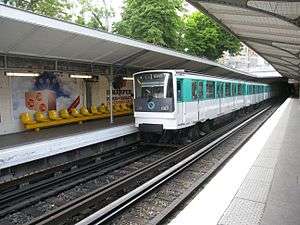Passy (Paris Métro)
| Paris Métro station | |||||||||||
 | |||||||||||
| Location |
16th arrondissement of Paris Île-de-France France | ||||||||||
| Coordinates | 48°51′27″N 2°17′09″E / 48.857445°N 2.285779°ECoordinates: 48°51′27″N 2°17′09″E / 48.857445°N 2.285779°E | ||||||||||
| Owned by | RATP | ||||||||||
| Operated by | RATP | ||||||||||
| Other information | |||||||||||
| Fare zone | 1 | ||||||||||
| History | |||||||||||
| Opened | 6 November 1903 | ||||||||||
| Services | |||||||||||
| |||||||||||
| Location | |||||||||||
 Passy Location within Paris | |||||||||||
Passy is a rapid transit station on Line 6 of the Paris Métro in the 16th arrondissement of the city. It is elevated at its eastern end, while its western end is in the mouth of a tunnel.
Location
It is connected to the Bir-Hakeim métro station and to the 15th arrondissement by the Pont de Bir-Hakeim, which was opened in 1906 and classified as an historic monument. In the other direction, the tunnel leads to Trocadéro métro station.
It is close to the Maison de Radio France, the headquarters of Radio France.
History
The station opened as part of the former Line 2 South on 6 November 1903, when it was extended from Trocadéro to Place d'Italie. On 14 October 1907 Line 2 South was incorporated into Line 5. It was incorporated into line 6 on 12 October 1942. It was named after the old village of Passy, and the Rue de Passy near the station. The villages of Passy, Chaillot and Auteuil were incorporated into Paris under Napoleon III in 1860 to form, with the Bois de Boulogne, the current 16th arrondissement of Paris. The station is near the location of the Barrière de Passy, a gate built for the collection of taxation as part of the Wall of the Farmers-General; the gate was built between 1784 and 1788 and demolished before 1859.[1][2][3][4]
Station layout
| Platform level | ||
| toward Charles de Gaulle – Étoile | ← | |
| toward Nation | | |
| 1F | Mezzanine for platform connection |
| Street Level |
Passy station lies above Rue de l'Alboni where the street becomes pedestrianised as a result of a steep grade. Like most Métro stations, it has two tracks and two side platforms; trains on the Métro run on the right, rather than the left as they do in the rest of France. To the west, trains enter a tunnel underneath the higher portion above Rue de l'Alboni.
Gallery
 Line 6 platforms at Passy
Line 6 platforms at Passy View towards Passy Viaduct and Bir-Hakeim station from Passy
View towards Passy Viaduct and Bir-Hakeim station from Passy MP 73 rolling stock on Line 6 at Passy
MP 73 rolling stock on Line 6 at Passy MP 73 rolling stock on Line 6 at Passy
MP 73 rolling stock on Line 6 at Passy
References
- ↑ "Barrière de Passy, picture" (in French). Bibliothèque nationale de France. Retrieved 20 December 2009.
- ↑ "Barrière de Passy, picture" (in French). Bibliothèque nationale de France. Retrieved 20 December 2009.
- ↑ "Barrière de Passy, picture" (in French). Bibliothèque nationale de France. Retrieved 20 December 2009.
- ↑ "Barrière de Passy" (in French). Bibliothèque nationale de France. Retrieved 20 December 2009.
| Wikimedia Commons has media related to Passy (Paris Metro). |